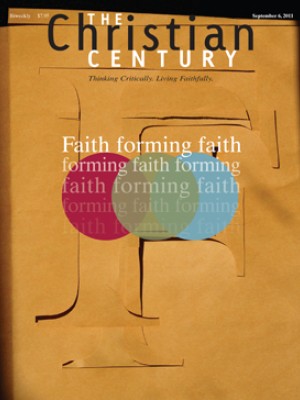Churches challenged on use of public schools
Every Sunday morning, P.S. 144 elementary school in Queens, like
dozens of schools in New York City and thousands more nationwide, is
transformed into a house of worship for a few hours, hosting the Forest
Hills Community Church with its prefab pulpit and portable baptistery.
There's
no tally of how many churches, synagogues and mosques convert public
school spaces into prayer places. What's clear is that there has been a
steady rise in numbers as congregations find schools to be available,
affordable and accessible to families they want to reach.
Read our latest issue or browse back issues.
Critics,
including some courts, are concerned that these arrangements are an
unconstitutional entanglement of church and state. They say these
bargain permits effectively subsidize religious congregations that would
have to pay much higher prices on the open market. They also note that
the practice appears to favor Christian groups, which worship on
Sundays—when school spaces are most often available.
Caught in the
middle are congregations such as Forest Hills, which spent $3,000 for a
permit to use P.S. 144 from February through June and renewed for July
and August. For September and beyond, however, nothing is certain.
The
city's Department of Education, which has been trying for a decade to
oust the congregations from its schools and end the weekend worship
practice, won the latest legal round in June. As the case winds its way
through more appeals, an injunction allows about 60 congregations to
remain in place and the permit process to continue.
So the Forest
Hills church's evangelical founder and pastor, Jeremy Sweeten, still
rises early each Sunday, hitches up a 20-foot trailer and tows it to the
school. The trailer, packed by PortableChurch.com, has every bit of
paraphernalia needed to create a sanctuary and children's Bible classes.
By
10 a.m., the Assemblies of God congregation of about 60 adults is
raising its voice in song and prayer. Then about 1 p.m., as swiftly as
they came, they're gone, with every offering basket stowed and every
Bible stashed away.
It's a familiar scene in many communities across the nation:
- USA Today
reported on the five largest and five fastest-growing school districts
in the continental U.S. and found that all ten had granted permits for
religious congregations to hold weekend worship. New York City, the
largest, is typical: Christian churches are the primary clients because
Muslims and Jews worship on Fridays and Saturdays, when school spaces
usually are used for student activities. - The Acts 29 Network, a
Seattle-based evangelical coalition that has started 350 churches
across the nation in the past five years, estimates that about 16
percent of these meet in school spaces. "We don't have a hidden agenda.
Our heart is to serve the community just like schools serve the
community. . . . They're designed for large groups, and they've got
parking," says Scott Thomas, Acts 29 president. - A 2007 national
survey of newly established Protestant churches found that 12 percent
met in schools, according to LifeWay, a Nashville, Tennessee-based
Christian research agency. LifeWay Director Ed Stetzer said the major
draw is that startup congregations and expanding multisite churches can
offer worship close to families' homes for a fraction of the cost of
creating their own building.
However, Stetzer, who also
leads church-planting efforts, said he sees the constitutional dangers.
Stetzer said he cautions school districts that they will have no control
over the religious preaching and teaching. "So if a Wiccan coven
[wanted a use permit], you would have to be as neutral as you would with
an evangelical church. Even Westboro [the Topeka, Kansas, congregation
that pickets funerals with signs denouncing gays] could move in and you
would have no way to stop them," Stetzer said.
In the New York
City case, the city school board's legal briefs argue that the practice
"improperly advances religion" by, in effect, subsidizing the churches
with facilities below market rate. It also shows "favoritism" to
Christian churches as religions that don't worship on Sundays are
generally shut out.
The Second U.S. Circuit Court of Appeals
agreed. In his June ruling, Judge Pierre Leval wrote that the Bronx
Household of Faith, ensconced since 2002 in P.S. 15, "has made the
school the place for the performance of its rites, and might well appear
to have established itself there. The place has, at least for a time,
become the church."
The Bronx church is seeking a rehearing.
Jordan Lorence, senior counsel for the Alliance Defense Fund, which
represents the church, expects that the U.S. Supreme Court will overturn
the ruling. "Religious groups, including churches, shouldn't be
discriminated against simply because they want to rent a public building
just like other groups can," Lorence said. —USA Today






